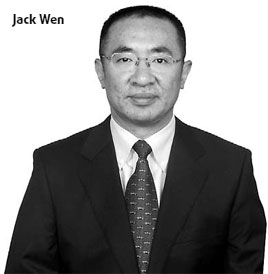

The company mantra at General Electric is that financial "numbers can only go up, never down", said Jack Wen - only half joking. That should make Wen's job even more of a challenge as the GE veteran took over as president and region executive of GE Energy China, just as a global recession kicked in. Nevertheless, he projected rising revenue in energy infrastructure, and also said that there's a growing appetite for green energy in China - though government policies are not yet in line with public opinion. Wen talked with China Business Weekly reporter Maggie Lee about GE's energy strategy.
Q: What is GE's long-term strategy for China, and has the recession changed those plans?
A: Our strategy is No 1 to capture the market potential and No 2 is to really build a strong business in cooperation with the local companies and also to compete with local companies.
In terms of the financial crisis and global recession, no one is immune from this issue For our industry it's a mix. On the one hand demand is slowing down, since electricity demand in China in January and February rises an average of 5 percent; that's a negative compared to last year. (But) China's $4 trillion yuan ($585 billion) stimulus package, in my view, will directly strengthen investment related to nuclear, transmission/distribution and the wind business as well.
Q: Which products are in most demand now and why?

A: Clean energy and environmental protection for example wind. In the past, the US is the No 1 and China is the No 2 market in the whole world. I see these two still continuing to be the main markets for wind turbines.
Q: How much are Chinese customers willing to pay for greener energy such as H-class gas turbines or cogeneration plants? Is that important to Chinese customers? (Note: H-class turbines are GE's newest and most efficient. Cogeneration plants capture otherwise wasted energy.)
A: It's very important (For example), 80 percent of (Beijing) people who were surveyed with a car still said "let's continue" (car restrictions to reduce traffic and pollution). People see the benefits and they've made up their mind they want to do it.
To me the issue is two questions. How we set up policy and how we get the money supporting that policy. Some of the policy is already set up. For example wind terraces. There is a subsidizing mechanism in China because the cost of wind power is higher than traditional coal power. So I hope there will be a clearer policy that can be drafted and put into operation.
Q: Since you work for so many government-owned clients, you're building vital infrastructure in China. How can you convince the Chinese people and Chinese government to accept a foreign company doing such strategic work? Do you find that an issue?
A: No, it's not like I can shut down their power plants. It's like providing equipment and most of the stuff is a commercial deal. They're looking for the most economic solution, considering performance, technology, pricing, service. I don't see much of an issue with security.
(China Daily 05/04/2009 page9)













